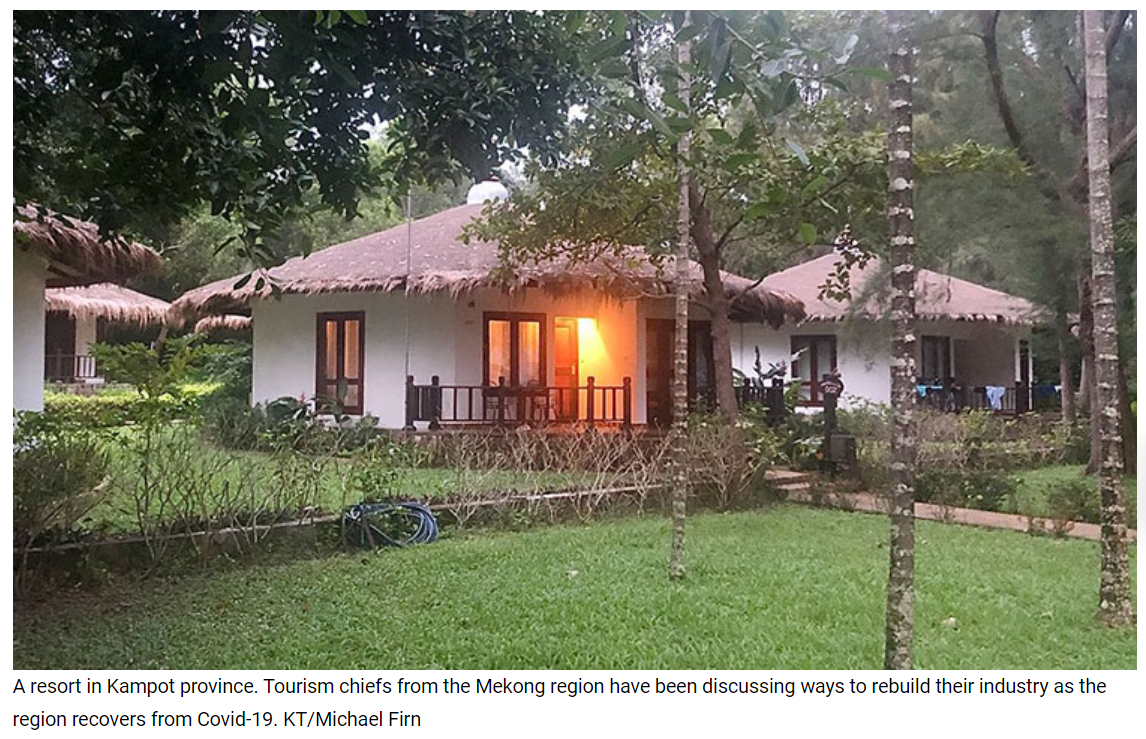Destination Mekong Summit discusses a sustainable tourism
Tourism experts from the Mekong region have been meeting online to discuss how to rebuild the industry as the Coronavirus pandemic eases in Asia. The six countries bordering the Mekong River are Cambodia, Vietnam, Thailand, Laos, Myanmar and China.
The meeting came as China cancelled hundreds of flights to try to stamp out a Covid-19 outbreak linked to a group of domestic tourists who travelled from Shanghai to Xi’an, Gansu province and Inner Mongolia.
At the same time Thailand announced that from Nov 1 it will allow quarantine-free entry for nationals of 46 countries including Cambodia and China but not Vietnam, Laos or Myanmar.
The Mekong Tourism Summit is a collaboration between the Greater Mekong Subregion, the Mekong Tourism Coordinating Office and the Mekong Tourism Organization.
Titled “Re-start, Re-form, Re-balance”, the summit looked at how the tourism sector could recover from the Coronavirus pandemic, which forced governments to shut their borders and restrict movement around their countries
“We look to rebuild tourism in the Mekong region and we need to start with creating confidence and trust for travellers to come to the Mekong region. That involves setting up health measures, looking at the right products, making sure that there is connectivity in place and having the right communications strategy,” said Destination Mekong founder and outgoing Mekong Tourism Coordinating Office Executive Director Jens Thraenhart. “The path to recovery is, first we need to engage businesses in the destinations. The destinations must be top of travellers’ minds and we need to build capacity, especially when it comes to digital transformation. Finally we need to generate revenue to make sure these businesses can survive the pandemic. We do this through an integrated tourism restart campaign that looks at storytelling as its core.”
He said the business model must change to public-private partnerships and collaboration to strengthen resilience and sustainability
Thraenhart talked of finding the right balance between too many and too few tourists. He cited Boracay in the Philippines as an example of over-tourism. The island was closed for six months in 2018 because of pollution. Thraenhart said any rebuilding of the industry must be based on sustainable development. Cambodia is adopting that concept for the redevelopment of Siem Reap, promoting other destinations in the province to take the strain off the Angkor Wat temple complex.
This year’s forum focused on hearing from small business operators to get the story of how they survived the pandemic and how they plan to rebuild, rather than from politicians and large tourism companies.
One exception was Thong Rathasak, director-general for Tourism Development and International Cooperation at Cambodia’s Ministry of Tourism. He talked of the need to build on the discussions at the 7th Greater Mekong Subregion Summit on Sept 9, when leaders discussed a mid-term recovery from Covid-19.
“Greater Mekong Subregion countries have already undertaken various measures to counteract the pandemic’s adverse impact on tourism. These include fiscal, monetary and training support for the travel and tourism businesses,” he said. “Since the subregion tourist industry has been severely impacted, the strategy will promote recovery efforts by developing high value-added and secondary destinations as well as training human capital, connectivity, infrastructure, public-private linkage and environmental sustainability. For instance, the Royal Government of Cambodia intends to turn the threat of Covid-19 into an opportunity for tourism reform in Cambodia and has adopted the roadmap for recovery during and post-Covid -19, 2020 to 2025,” he said.
It’s the second consecutive year that the Mekong Tourism Coordinating Office has opted for a virtual edition of its annual trade event. The two-day event wrapped up on Friday.
Source: https://www.khmertimeskh.com/50958211/destination-mekong-summit-discusses-a-sustainable-tourism/


 English
English




